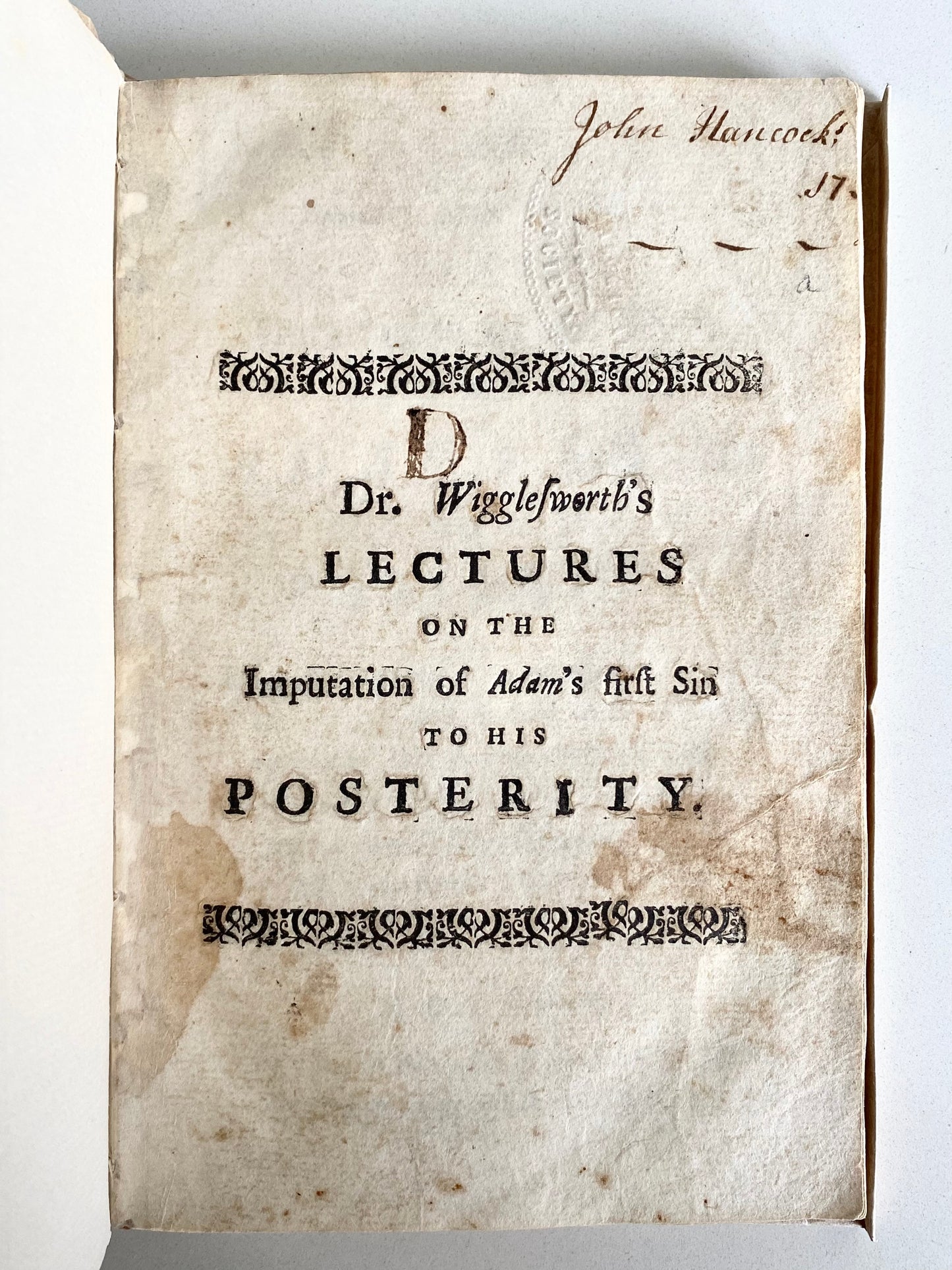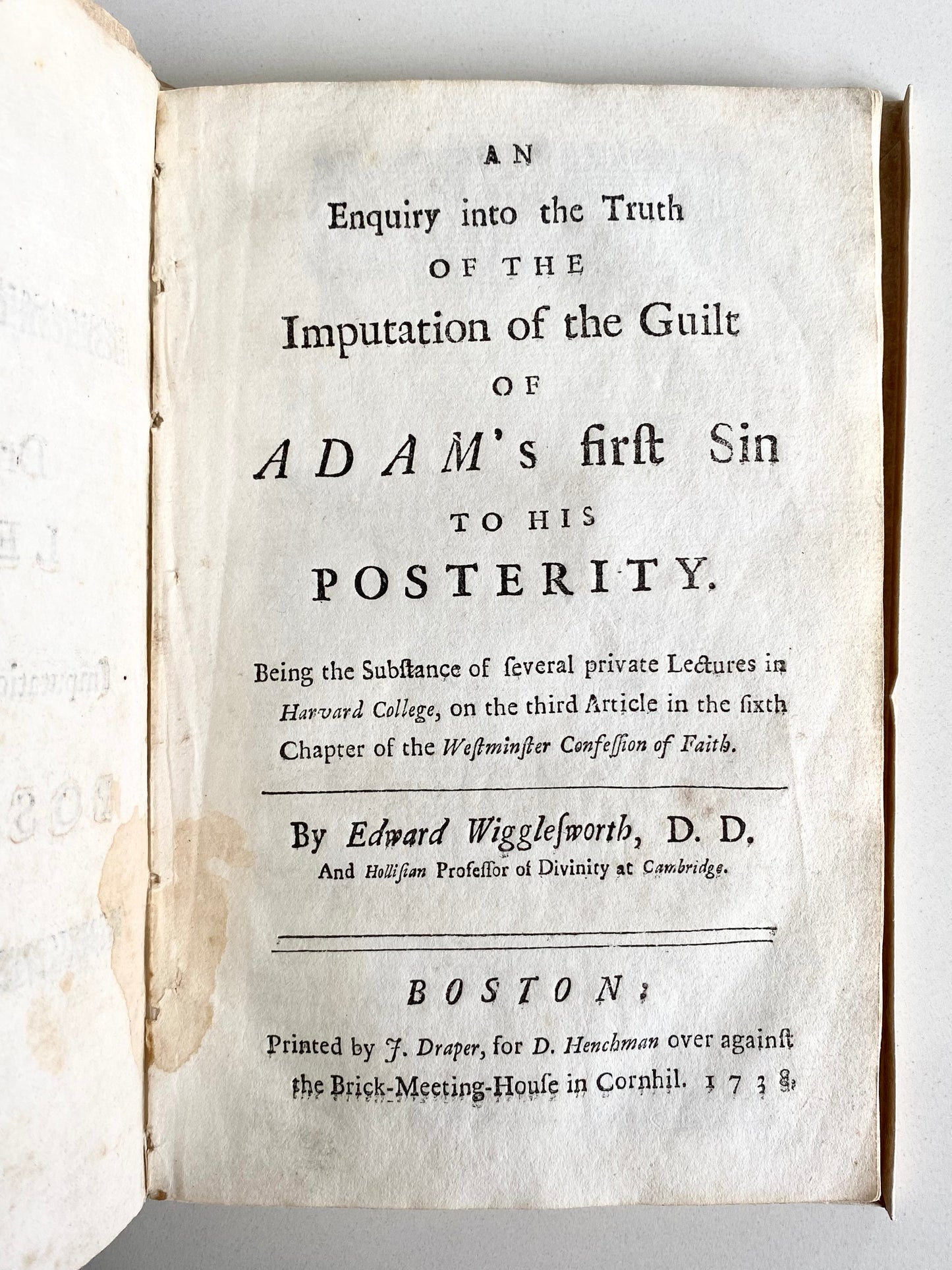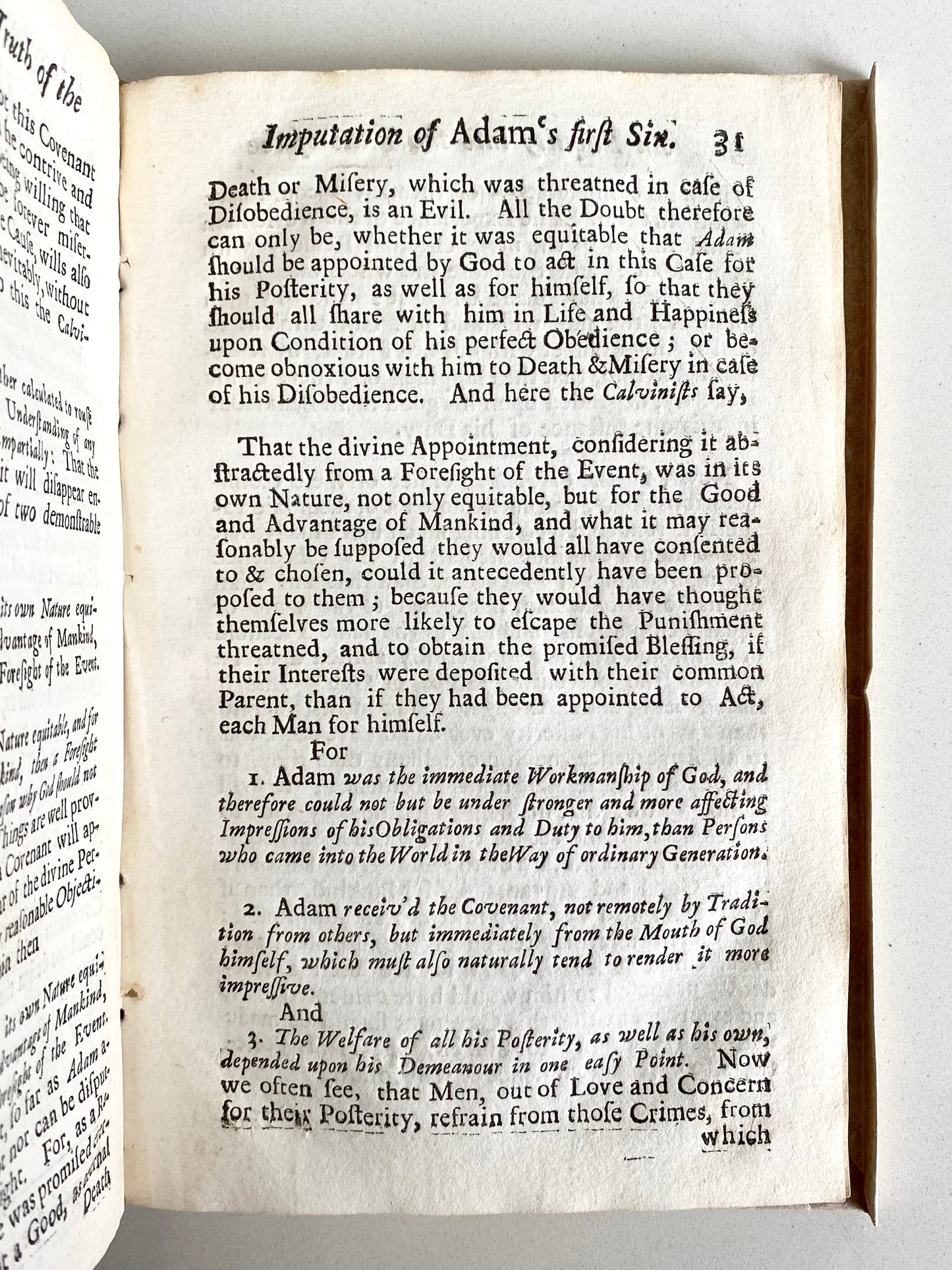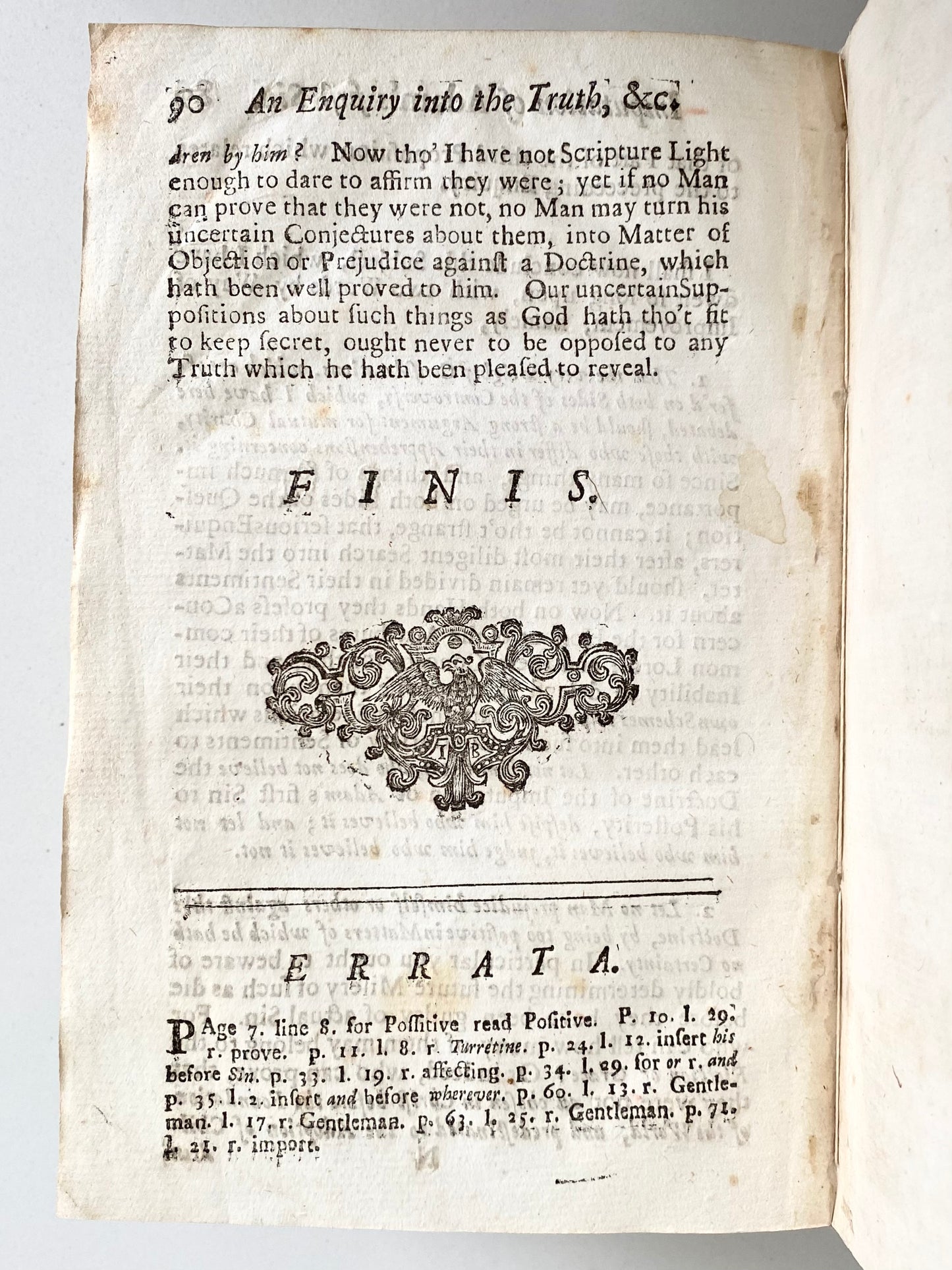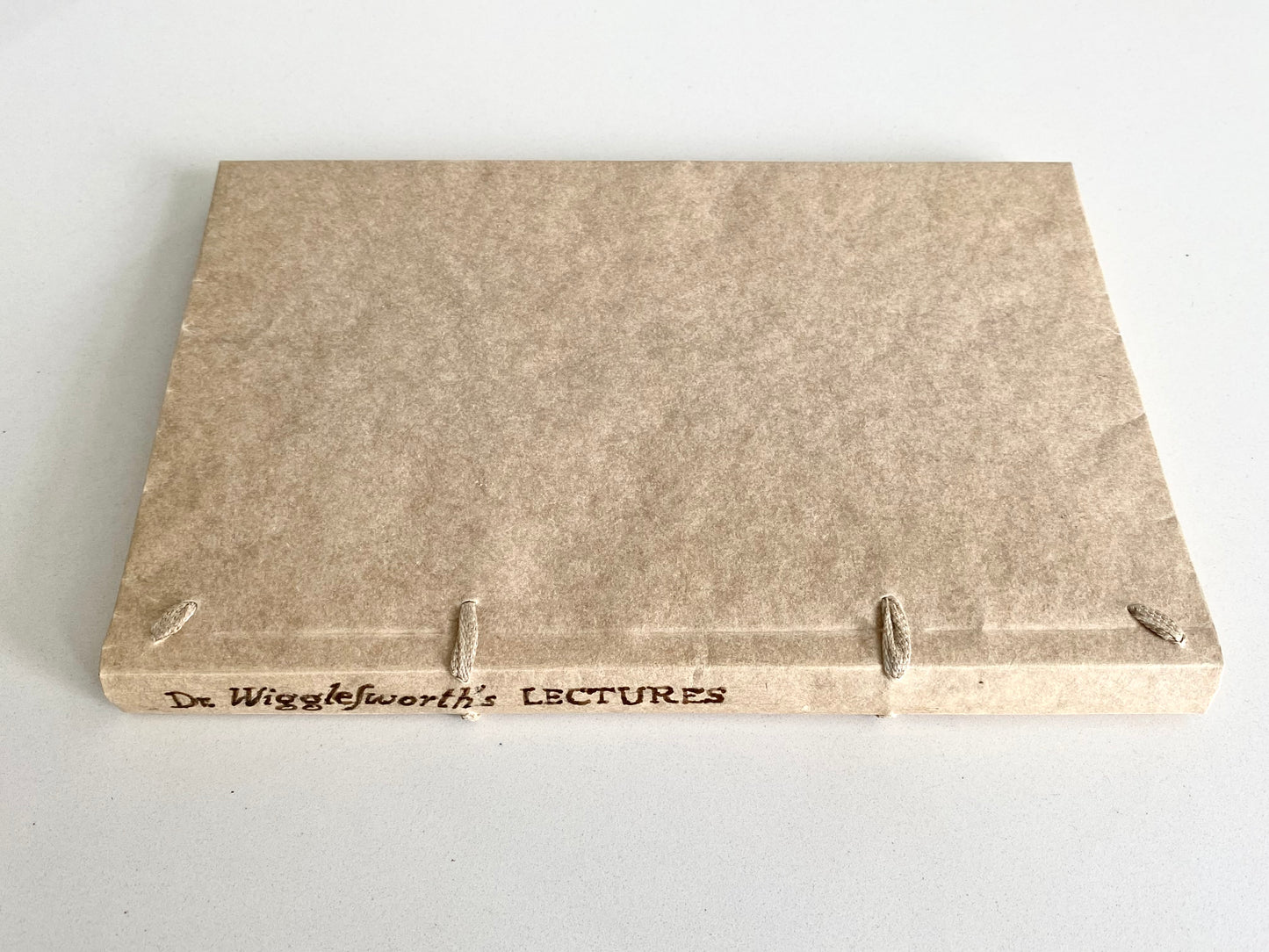Specs Fine Books
1738 JOHN HANCOCK. The Founding Father's Personal Copy of a Formational Work on Religious and Political Toleration.
1738 JOHN HANCOCK. The Founding Father's Personal Copy of a Formational Work on Religious and Political Toleration.
Couldn't load pickup availability
An important artifact connecting two important voices for religious and political liberty and toleration in the emerging American documentary landscape.
The author of our work, Edward Wigglesworth the Elder [1693-1765], was the first Professor of Divinity ever commissioned in the American Colonies. He held the newly minted Hollis Chair of Divinity at Harvard and was a critical voice in the emerging religious and theological landscape.
And that irenic voice was needed. There were radical tendencies on every side. Strains of Presbyterianism wanted to revisit the "Solemn League and Covenant," enforcing the narrowest interpretations of the Westminster Confession of Faith as the law of the land. Congregational Revivalists were equally assertive in wanting to undo the damage inflicted by the Halfway Covenant, etc., The Methodists, Baptists, and Catholics, not to mention Deists, sat with a bit of trembling on the sideline to see what liberty or persecution would come their way as the foundational documents of America were hammered out. Wigglesworth's influence helped ensure there would be room for everyone in the new America.
The Harvard professor was perhaps the most important theological and pastoral voice of his era; a man given to and reputed for his moderation, a virtual "apostle of balance." He warned against theological narrowness, especially when it came to the intermingling of religious and political policy. He issued a series of works urging moderation for the revivalists following the visitations of George Whitefield to New England. And in the present work, even on the bedrock ideas surrounding the heritability of Adam's original sin, he pushes for room to dialogue on an incredibly difficult issue. He understood that one's view of free will could have a significant impact on how one viewed a nation's responsibility to allow for religious liberty and saw religious liberty at stake in the present theological discussion.
The present work was likely originally the property of John Hancock the Elder [1702-1744], who was himself a clergyman who studied under Hollis at Harvard and, of course, father to Founding Father John Hancock the Younger [1735-1793].
Rev. John Hancock the Elder died when John Hancock the Younger was just 7 years old. The young Founding Father enrolled at Harvard in 1750 and was likely given his father's library at that point. The inscription on our present volume dates to this period [see dating detail below]. Edward Wigglesworth the Elder still held the Hollis Chair at the time of the Younger Hancock's time as well, infusing his views of the need for religious toleration and moderation into one of the most formative voices of the emerging Nation through both lectures and written works like the present.
By time Hancock found himself in the heat of the American Revolution, we see the fruits of those earlier Wigglesworthian seeds. In a letter exchange between George Washington and John Hancock [dated to June of 1777] regarding the selection of Chaplains, the two are clear that they are looking for Chaplains who would not "compel men to a mode of worship, which they do not profess," and who would follow a plan of a "more generous toleration." And when the Massachusetts Constitutional Convention struggled to confirm the Constitution, it was Hancock who brought Federalists and Anti-Federalists because he was trusted by both as a voice of moderation.
The relationship between the Hancocks and Wigglesworth's continued with John the Younger and the Younger Wigglesworth [1732-1794] as well. The Younger Wigglesworth took up Hollis Chair of Divinity after his father's tenure of 42 years and the Youngers worked together in the formation of the Society for Propagating the Gospel among the Indians and others in North-America.
A wonderful document demonstrating the roots of the theological [and inherently political in the thinking of the day] tolerance present in the perspectives of an important American Founding Father.
Wigglesworth, Edward. An Enquiry into the Truth of the Imputation of the Guilt of Adams' First Sin to His Posterity. Being the Substance of Several Private Lectures in Harvard College, on the Third Article in the Sixth Chapter of the Westminster Confession of Faith. Boston. Printed by J. Draper, for D. Henchman over against the Brick-Meeting-House in Cornhil, 1738. 90pp.
[Half Title] Dr. Wigglesworth's Lectures on the Imputation of Adam's First Sin to His Posterity.
Attractively signed by John Hancock the Younger on the upper right of the half title in his earlier, less demonstrative signature. As in other early examples, having three simple lines under his name. This would later by replaced by his classic flourish. A signature showing him still in development, which seems appropriate to the formational nature of the document itself. It is dated to 175*, with the final number trimmed likely when bound at some point. Almost certainly sometime between 1750 and 1754, his years at Harvard.
There is also one further fugitive scribble on the half title, a large "D," likely in the hand of one or other of the two while students at Harvard.
A well-preserved copy with woodcut initials and head and foot pieces throughout. The half title is lightly soiled and trimmed impacting the inscription date. There is a further 20th century discrete stamp on the interior. Otherwise crisp, bright, and clean textually.
Bound in a plain stitched parchment cover with spine titling. A very handsome, understated presentation.
Share

